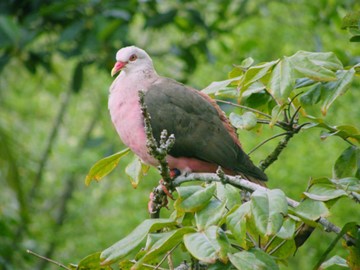Not too unlike the plot of the movie Jurassic Park, a team of well-funded scientists are attempting to bring the extinct dodo back to life.
Last month, the billion-dollar genetics company Colossal Biosciences announced it would be partnering with a wildlife charity in Mauritius to try and bring one of the world’s most famously extinct creatures to the region again.
In a press release, the Dallas-based company said it would work closely with the Mauritian Wildlife Foundation and the country’s government to return the dodo to its East African home, where it went extinct in 1681.
The company called the dodo an “iconic bird and a symbol of human-caused extinction.”
The dodo, which was bigger than an average turkey, disappeared due to hunting by humans (it had no other predators) and the introduction of new animals to the region, making the dodo unable to compete in the wild.
Colossal Biosciences said the project will hopefully allow for improved conservation efforts for other already endangered animals in Mauritius. As part of their effort to revive and reinstate the dodo, the company and local wildlife officials said they will also remove invasive species, revegetate the region and increase community awareness.
Get the latest National news.
Sent to your email, every day.
The “genetic rescue” of Mauritius’ already vulnerable pink pigeon (Nesoenas mayeri) is a specific goal within the dodo “de-extinction” project. The pink pigeon was downgraded from being an endangered species in 2018, though the species still faces a difficult future as a result of inbreeding, disease and habitat loss. According to Colossal Biosciences, there are roughly 500 pink pigeons left in Mauritius.
By making room for the flightless dodo, conservationists and scientists from Colossal Biosciences hope they’ll save others like the pink pigeon from potentially facing the same fate.

A pink pigeon.
Mauritius Wildlife Foundation
How will they make the dodo ‘de-extinct’?
As expected, it’s no easy feat to resurrect an extinct animal.
In their attempt to bring the dodo back, scientists will use genomic editing technology. The bird’s full genome has already been sequenced by Beth Shapiro, the lead paleo-geneticist at Colossal Biosciences.
To try and produce the dodo, the company said they will use interspecies surrogacy, namely with genetically modified chickens. According to the company, in theory, a chicken which has the hybridized primordial germ cells (or PGCs) of a dodo injected into its embryo may be able to produce offspring that resembles the extinct bird.
For its part, Mauritian Wildlife Foundation will build models for long-term management of the dodo to ensure it will thrive and be self-sustainable after its reintroduction to the wild.
It is not yet clear when Colossal Biosciences will be able to “de-extinct” the dodo — though company executives have fielded snide remarks about their projects for years now, including endless Jurassic Park comparisons.
“We’ve heard all of those comments over the years,” Ben Lamm, the company’s co-founder and CEO, told the Dallas Morning News. “But we have an opportunity to do it for good reasons because when you remove an animal from an ecosystem, that ecological void is felt. We’re not out to build things that shouldn’t exist. We’re focused on undoing the sins of the past and bringing back species to their native homes that mankind had a role in its demise.”
The dodo is not the first creature to be chosen by Colossal Biosciences for a potential second life. The company earlier announced it would also attempt to revive the Tasmanian tiger and woolly mammoth, both of which remain extinct.
© 2023 Global News, a division of Corus Entertainment Inc.











